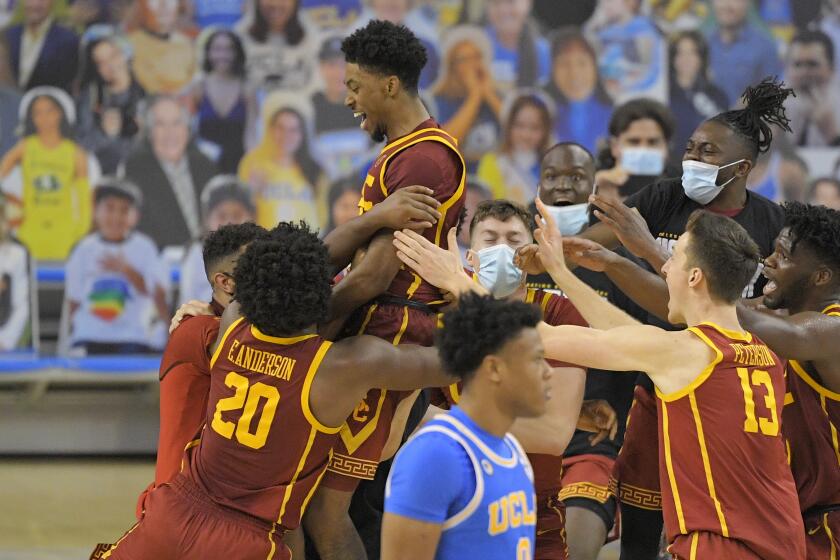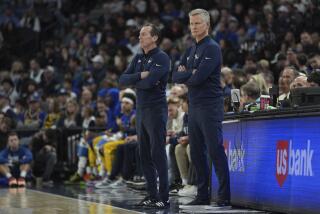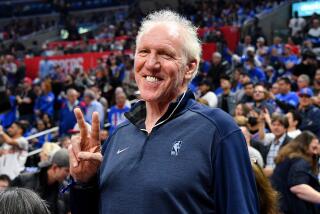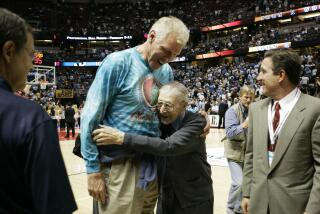Column: Dave Holmquist found a home at Biola and a guru in John Wooden en route to 1,000 wins
Dave Holmquist’s journey to 1,000 college basketball coaching victories nearly ended before it began.
He hadn’t set out to become a coach but at 24, barely a year after he’d completed his playing career at Biola College, he became coach of the Fresno Pacific men’s team. He was hired late in the summer of 1975 and didn’t have much time to prepare. The team he inherited had gone 9-16 the previous season but had recorded only five of those wins on the court, picking up the other four via forfeit. “So I knew it was going to be a tough year,” Holmquist said.
It was as challenging as he expected, and more.
“I remember driving back from a tournament at Stanislaus State with my team. We were 0-10 and I was really wondering, ‘What am I doing? What else could I do in life besides this?’ ” he said.
“What is it, 45, 46 years later, I’m still coaching.”
Holmquist met that initial challenge with the intellectual curiosity and teacher’s instinct that became his hallmarks. After improving from 8-17 in his first season to 15-12 in his third season, he left Fresno Pacific in 1978 to coach at Biola, a private Christian university in La Mirada that competes at the NCAA Division II level in the Pacific West Conference.
It’s at Biola — known as Biola University since 1981 — that he has prepared generations of young men as much for life as for games. Along the way he earned a doctorate (physical education), five master’s degrees (physical education; marriage, family and child counseling; history; theology, and philosophy), and, on Feb. 27, earned the 1,000th win of his coaching career.
Tahj Eaddy sank a three-pointer off an inbounds pass with 1.4 seconds remaining as USC extended its winning streak over UCLA in a 64-63 victory.
Holmquist, 70, is the fifth coach in four-year college men’s basketball history to be credited with 1,000 career victories. The leader is Mike Krzyzewski, who has 1,169 wins with Army and Duke.
COVID-19 protocols muted Holmquist’s celebrations of his milestone but he wouldn’t have wanted a fuss, anyway.
“It’s an empty gym, so it’s just the two teams, the coaching staffs, the table crew and maybe two or three administrators,” he said of the scene after his Eagles won at Concordia Irvine. “It’s such a different year. But in some ways that was real nice because there were no distractions. You’re just with your team and you’re most grateful to your team and you want to spend that time with your team.”
Over the years, Holmquist, who also was Biola’s athletic director for 27 years, saw friends become assistant coaches in major programs. He stayed put.
“I suppose if somebody had asked me it would have been hard to say no. I had some chances in the ‘80s, maybe go the route that could eventually lead to being at that level, but I was enjoying where I was so much I just felt it was the right fit for me,” said Holmquist, who was born in Minneapolis but moved to Southern California with his family when he was a year old.
“It also allowed me to go to school and do some other things that I wanted to do. I never had to worry about job security. The money wasn’t a big motivator. I made more than enough for my needs. And I just enjoyed this level. I enjoyed the players I had. I enjoyed working at the school very much and I was always very content where I was.”
One thousand wins. It’s mind-boggling. Think of how dramatically basketball has evolved since he began coaching.
“All of the changes have been in favor of the offense, which I think is true in all sports, and we’ve always tried to make the hallmark of our program the defense and we’ve continued to do that as the game has changed,” Holmquist said. “But it is a very different game with the shot clock and the three-point line. Those weren’t in existence when I started.”
Think of the changes he has seen in the world around him.
“People ask me sometimes are players a lot different today than they were back then, but as I look at this current team, they would have fit in well with those teams 40 years ago in terms of work ethic and what it means to be a teammate,” Holmquist said. “I know the culture has changed. Society has changed, but I think there’s still a lot of great people, very coachable people, out there. I’ve certainly been blessed that way.”
Being open to new ideas keeps him vital.
“Learning is just part of the fabric of who he is,” said Bethany Miller, his successor as Biola’s athletic director. “His relentless nature to learn more from people and from processes make him who he is.”
Late-in-life fatherhood — his sons are 13 and 10 — also helps keep him young.
“He’s really relatable,” said junior guard Alex Wright of Riverside. “He’s super knowledgeable, so it’s a fun thing to pick his mind and hear his stories on car rides, like all the little things he’s done before and the places he’s been and just advice. He gives great advice.”
Rich Cundall, a member of the 1981-82 NAIA runner-up Biola team that went 39-1, is constantly awed by his coach’s impact.
“A thousand wins is only part of the story,” said Cundall, a pastor in Sebastopol, Calif. “I can’t tell you the number of alumni that tell me, ‘He changed my life. The program changed my life.’
“He’s a wonderful guy that has not just taught us about basketball but has influenced our lives as leaders in our communities and in our churches, in whatever profession we do.”
Long ago, Cundall asked Holmquist to be the best man at his wedding.
“I’ve cried with the guy. I have no shame to tell you. I’ve opened up my life to the guy as I’ve gone through the highs and lows of life,” Cundall said. “And I know what he’s done for me, he’s done for many other players as well.
“A lot of guys know about Xs and O’s. They know how to run offenses and defense and whatnot, but what made Dave and makes Dave extraordinary is his ability to be a student not only of the game but of his players. He understands how to motivate and inspire and believe in his players to get the most out of them. Along the way he teaches amazing life lessons about sacrifice and about courage and about doing what is best for the greater good of the team, not just for yourself.”
Holmquist was deeply influenced by John Wooden, whom Holmquist met while a student at Cypress College, before he transferred to Biola. Cypress College was coached by Don Johnson, one of Wooden’s first All-America players at UCLA, and Johnson would take Holmquist to visit Wooden. The visits continued for years. Basketball strategy rarely came up.
“He was a great collector of poems, proverbs, scripture, stories, adages and quotations,” Holmquist said. “I remember one Friday night he took this folder out and read to me for over three hours without stopping. I didn’t say a word. I just listened. I remember I just marveled at how deeply he felt about what he was reading, and I realized that’s how he led his life. He led his life by those basic, fundamental truths. That’s how he coached and that’s how he lived life.”
Wooden often cited a quote from Cervantes: “The road is better than the inn.” It’s a favorite of Holmquist’s too.
“He would talk a lot about whatever achievements or accomplishments, they won’t quite be the thrill we think they will be. We’ve got to learn to enjoy the daily struggle and enjoy that day, the present moment, and so that was the biggest thing that I took from him that I applied to my coaching career and also to my life,” Holmquist said.
Miller said Holmquist is welcome to coach at Biola “as long as he wants to be here. He’s an incredible asset to us.” Holmquist is as energized about the Eagles’ postseason chances — they are seeded third in the regional tournament next weekend in Golden, Colo. — as he is about every practice and game.
“I still enjoy it,” he said. “As long as I stay healthy and I feel like I have sufficient energy and still enjoy it, I want to keep doing it.”
His teams aren’t on national TV and he’s not famous but he has succeeded in more ways than he could have imagined when he was 0-10 and questioning his calling. Coaching chose him more than he chose the profession, but it has been the perfect fit.
More to Read
Go beyond the scoreboard
Get the latest on L.A.'s teams in the daily Sports Report newsletter.
You may occasionally receive promotional content from the Los Angeles Times.












